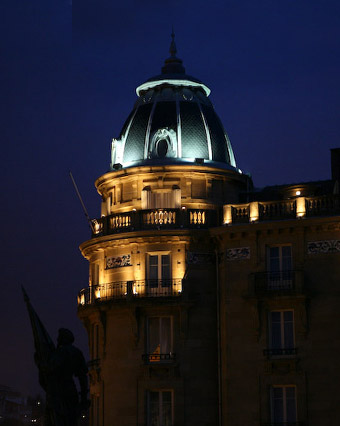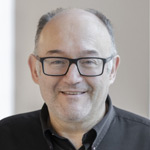The Company FESTIVAL INTERNACIONAL DE CINE DE DONOSTIA-SAN SEBASTIÁN is made up in equal parts of the City Council of Donostia-San Sebastian, the Basque Government, the Gipuzkoa Regional Government and the Ministry of Culture, and the chairmanship is held by the Mayor of Donostia-San Sebastian.
MANAGEMENT AND SELECTION
Deputy Directors
Finance Director
Management Committee
Selection Committee
Head of Industry
Communication Manager
Spanish Press
Foreign Press
JOSE LUIS REBORDINOS
(1961, Errenteria)
Member of the European Film Academy (EFA) and Honorary member of the Academy of Arts and Cinematographic Sciences of Argentina. In 2015 the Council of Ministers on Spain bestowed him the Gold Medal for Merit in the Fine Arts. In 2021, the French Ministry of Culture appointed him Chevalier de l'ordre des arts et des lettres (Knight of the Order of Arts and Letters of the French Republic).Holds a degree in Special Pedagogy. Director of the Donostia Kultura Film Unit for 22 years. Director for 21 years of the Horror and Fantasy Film Festival and director for 8 years of the Human Rights Film Festival, both in San Sebastian. He has directed the Nosferatu collection for 22 years. He is the co-author of several books on Basque filmmakers including Elías Querejeta, Montxo Armendáriz, Antxon Eceiza, Julio Medem and Javier Aguirresarobe, among others, and on Asian cinema (Shinya Tsukamoto, poeta y guerrillero del cinematógrafo). He has also written on a variety of subjects (El dolor, los nervios culturales del sufrimiento – Breve historia del cortometraje vasco). Before taking up his position as Director General of San Sebastian Festival on January 1st 2011, he had been a member of its Management Committee for the previous 15 years. Member of the Asian Future Jury at the 30th edition of the Tokyo International Film Festival in October 2017. In August 2018 he was part of the First Look Jury of the Locarno Film Festival. Selection of the BWIP (Bloody Work in Progress) section, since the first edition of Blood Window in 2013, Ventana Sur, Argentina. Member of the Cultural Advisory Board of Casa Asia. In November 2024 he was awarded the “Tilda Thamar” Lifetime Achievement Award for his work and commitment to cinema, presented by the government and the FICER Festival of the province of Entre Ríos (Argentina).
LUCÍA OLACIREGUI
(1972, San Sebastian)
 Holds a degree in Media Studies from the University of Navarre and a postgraduate degree in Cultural Resource Management from the University of Deusto. She was a Technician with the Donostia Kultura Film Unit from 2000 until 2010. Deputy Director for 10 years of the Horror and Fantasy Film Festival and Deputy Director for 8 years of the Human Rights Film Festival, both in San Sebastian. During that time, she was also a member of the Nosferatu magazine editorial committee. Since 2004, she sits on the selection committee for short films screened in Kimuak, a programme to internationally promote and distribute Basque shorts organised by the Basque Government. She has been a member of the Selection Committe since 2006, was appointed as the Assistant Director of the San Sebastian Film Festival on January 1st 2011 and is Deputy Director of the Festival since 2016.
Holds a degree in Media Studies from the University of Navarre and a postgraduate degree in Cultural Resource Management from the University of Deusto. She was a Technician with the Donostia Kultura Film Unit from 2000 until 2010. Deputy Director for 10 years of the Horror and Fantasy Film Festival and Deputy Director for 8 years of the Human Rights Film Festival, both in San Sebastian. During that time, she was also a member of the Nosferatu magazine editorial committee. Since 2004, she sits on the selection committee for short films screened in Kimuak, a programme to internationally promote and distribute Basque shorts organised by the Basque Government. She has been a member of the Selection Committe since 2006, was appointed as the Assistant Director of the San Sebastian Film Festival on January 1st 2011 and is Deputy Director of the Festival since 2016.
MAIALEN BELOKI BERASATEGUI
(1983, San Sebastian)

Deputy Director of the San Sebastian Festival since 2016.
Coordinator of Z365/ the "Festival all year round", the institution's major strategic commitment combining its fundamental lines of action in the 21st century: the search for, accompaniment and development of new talents (Ikusmira Berriak, Nest); training and knowledge transfer on the subject of film (Elías Querejeta Zine Eskola, Zinemaldia +, Filmmakers’ Dialogue); and cinematic research and thinking (Artxiboa, the Zine publication).
Graduate in Audiovisual Communication from the University of Navarra (Pamplona) 2002-2005. Doctor, outstanding culm laude, in Film Theory, Analysis and Documentation (doctoral thesis Between Antonio and Antxon Eceiza. Cinema and politics) from the Public University of the Basque Country, Leioa, 2006-2010.
She collaborated in setting the Elías Querejeta Zine Eskola film school in motion and is a lecturer and a member of its Academic Directorate. She was a lecturer in communication at the HUHEZI faculty of Mondragon University.
She has given numerous lectures at national and international film festivals, universities and cultural institutions on film festivals and their future, and on the history of Spanish cinema and its filmmakers (Antxon Eceiza, Luis García Berlanga, Josefina Molina, etc.)
She participated in the book Antxon Eceiza, cine existencialismo y dialéctica (Jesús Angulo, Maialen Beloki, José Luis Rebordinos, Antonio Santamarina, Filmoteca Vasca, 2010), Cine vasco: tres generaciones de cineastas (Filmoteca Vasca, 2015) ) and Zinemaldia 1953-2022. Singularidades del Festival de Donostia/San Sebastián (Colección Nosferatu, 2022). In 2022 she published Antxon Eceiza, vidas, tiempos, obras (Shangrila Hispanoscope)
She participated in the selection of projects for the Luis García Berlanga research grants of Spanish Academy of Arts and Cinematographic Sciences (2020). She participated in the short film selection Kimuak, the Basque government programme for the international promotion and distribution of Basque short films (2012, 2013). She participates in the selection of projects for Noka Mentoring, a programme promoted by the Basque Government to tutor, accompany and support feature film projects by emerging female directors based in the Basque Country and Navarre. She has been a member of the Commission for Distribution Aids of the Institute of Cinematography and Audiovisual Arts (ICAA). She was a member of the Basque Council of Culture of the Basque Government. She is a Corresponding Academician for the province of Gipuzkoa of the Royal Academy of Fine Arts of San Fernando.
AMAIA ELIZONDO
(1975, San Sebastian)
 Holds a degree in Management and Business Administration from the University of Deusto. Has developed her professional career in the financial management and accounting field for over twelve years. Started her working experience with the major international auditors, KPMG, where she held the position of manager. Before joining San Sebastian Film Festival in May 2010, she belonged to the Vodafone Financial Department, where she was responsible for the fulfilment of international and local accounting regulations, leading projects linked to direct relations with the mother company in the UK, introduction of the New General Accounting Plan and managing external audits. She also represented the Accounting Department on a variety of operating and management committees.
Holds a degree in Management and Business Administration from the University of Deusto. Has developed her professional career in the financial management and accounting field for over twelve years. Started her working experience with the major international auditors, KPMG, where she held the position of manager. Before joining San Sebastian Film Festival in May 2010, she belonged to the Vodafone Financial Department, where she was responsible for the fulfilment of international and local accounting regulations, leading projects linked to direct relations with the mother company in the UK, introduction of the New General Accounting Plan and managing external audits. She also represented the Accounting Department on a variety of operating and management committees.
QUIM CASAS
(1959, Barcelona)
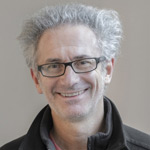 Professor of Audiovisual Communication at the Pompeu Fabra University in Barcelona and ESCAC. He has taught at the UOC (Universitat Oberta de Catalunya) and at the Blanquerna-Universitat Ramon Llull. He contributes to Dirigido por, Imágenes de Actualidad, El Periódico de Catalunya and Rockdelux. Author of books about John Ford, Fritz Lang, Raoul Walsh, Howard Hawks, Sam Fuller, John Carpenter, Clint Eastwood, David Lynch, Jesús Garay, superheros cinema and La vida va en serie about television series. He has also contributed to different group volumes focussing on musical and film themes, from Alain Resnais to the relationship between film and electronic music. As far as publications at San Sebastian Festival are concerned, he has coordinated books dedicated to Abel Ferrara, Barbet Schroeder, Philippe Garrel, Terence Davies, Henry King, Mario Monicelli, Richard Brooks, Don Siegel and new French cinema, Jacques Demy, Georges Franju, Nagisa Oshima, Merian C. Cooper-Ernest B. Schoedsack, Jacques Becker and Joseph Losey.
Professor of Audiovisual Communication at the Pompeu Fabra University in Barcelona and ESCAC. He has taught at the UOC (Universitat Oberta de Catalunya) and at the Blanquerna-Universitat Ramon Llull. He contributes to Dirigido por, Imágenes de Actualidad, El Periódico de Catalunya and Rockdelux. Author of books about John Ford, Fritz Lang, Raoul Walsh, Howard Hawks, Sam Fuller, John Carpenter, Clint Eastwood, David Lynch, Jesús Garay, superheros cinema and La vida va en serie about television series. He has also contributed to different group volumes focussing on musical and film themes, from Alain Resnais to the relationship between film and electronic music. As far as publications at San Sebastian Festival are concerned, he has coordinated books dedicated to Abel Ferrara, Barbet Schroeder, Philippe Garrel, Terence Davies, Henry King, Mario Monicelli, Richard Brooks, Don Siegel and new French cinema, Jacques Demy, Georges Franju, Nagisa Oshima, Merian C. Cooper-Ernest B. Schoedsack, Jacques Becker and Joseph Losey.
ROBERTO CUETO
(1965, Madrid)
 Roberto Cueto obtained his degree in Spanish Philology at the Complutense University in Madrid. A member of the San Sebastian Festival Selection Committee, he is also an associate professor of Audiovisual Communication at the Carlos III University. He was formerly coordinator of the Cinematheque programme at the Matadero cultural centre in Madrid. He has given classes, courses and seminars at the Madrid Film School (ECAM) and at numerous Spanish universities. He has written several books and has collaborated with articles in various collective books on different cinematic subjects, including Asian cinema. As well as numerous articles, he coordinated the special volume on New Korean Cinema for the Nosferatu magazine and contributed to the book Seoul Express: The Renovation of Korean Cinema, published by the Las Palmas Film Festival. He was the advisor and editor of texts at the Korean Cinema-Arco 2007 season as part of the ARCO Contemporary Art Fair, and was named Korean Culture Supporter 2016 by the Korean Cultural Centre in Spain, with which he regularly collaborates. He has also collaborated in different activities with the Polish Cultural Institute and the Romanian Cultural Institute.
Roberto Cueto obtained his degree in Spanish Philology at the Complutense University in Madrid. A member of the San Sebastian Festival Selection Committee, he is also an associate professor of Audiovisual Communication at the Carlos III University. He was formerly coordinator of the Cinematheque programme at the Matadero cultural centre in Madrid. He has given classes, courses and seminars at the Madrid Film School (ECAM) and at numerous Spanish universities. He has written several books and has collaborated with articles in various collective books on different cinematic subjects, including Asian cinema. As well as numerous articles, he coordinated the special volume on New Korean Cinema for the Nosferatu magazine and contributed to the book Seoul Express: The Renovation of Korean Cinema, published by the Las Palmas Film Festival. He was the advisor and editor of texts at the Korean Cinema-Arco 2007 season as part of the ARCO Contemporary Art Fair, and was named Korean Culture Supporter 2016 by the Korean Cultural Centre in Spain, with which he regularly collaborates. He has also collaborated in different activities with the Polish Cultural Institute and the Romanian Cultural Institute.
DESIRÉE DE FEZ
(1977, Barcelona)
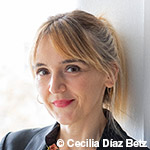 Film critic, journalist and teacher. With a Degree in Journalism from the Universitat Ramon Llull, Desirée is a columnist with El Periódico de Catalunya and collaborates as a critic with the magazines Fotogramas and Rockdelux, with Catalunya Ràdio's La Finestra Indiscreta and with the TVE programmes Página Dos and Punts de Vista. She teaches at the UOC (Universitat Oberta de Catalunya) and at other film schools and has experience as a fiction screenwriter and script consultant. Member for more than a decade of the team at the Sitges-International Fantastic Film Festival of Catalonia, where she worked on the coordination of books and programme consultancy, she also directs and conducts the podcasts Marea Nocturna (Radio Primavera Sound), specialised in fantastic and horror films, and Reinas del grito (Blackie Books), conversations with women creators of different disciplines around the concept of fear. She has participated in numerous anthology volumes, many published in the framework of the San Sebastian and Sitges festivals, and is author of the books Películas clave del cine de terror moderno, Pantalla Rasgada: Quince conversaciones con cineastas y escritores sobre sueños y cine (written with Jordi Sánchez-Navarro) and several volumes on the filmography of J.A. Bayona. Her most recent publication is Reina del grito, a combination of essay and autofiction in which she explores the fears of women based on her personal relationship with horror movies, a genre in which she specialises.
Film critic, journalist and teacher. With a Degree in Journalism from the Universitat Ramon Llull, Desirée is a columnist with El Periódico de Catalunya and collaborates as a critic with the magazines Fotogramas and Rockdelux, with Catalunya Ràdio's La Finestra Indiscreta and with the TVE programmes Página Dos and Punts de Vista. She teaches at the UOC (Universitat Oberta de Catalunya) and at other film schools and has experience as a fiction screenwriter and script consultant. Member for more than a decade of the team at the Sitges-International Fantastic Film Festival of Catalonia, where she worked on the coordination of books and programme consultancy, she also directs and conducts the podcasts Marea Nocturna (Radio Primavera Sound), specialised in fantastic and horror films, and Reinas del grito (Blackie Books), conversations with women creators of different disciplines around the concept of fear. She has participated in numerous anthology volumes, many published in the framework of the San Sebastian and Sitges festivals, and is author of the books Películas clave del cine de terror moderno, Pantalla Rasgada: Quince conversaciones con cineastas y escritores sobre sueños y cine (written with Jordi Sánchez-Navarro) and several volumes on the filmography of J.A. Bayona. Her most recent publication is Reina del grito, a combination of essay and autofiction in which she explores the fears of women based on her personal relationship with horror movies, a genre in which she specialises.
JOXEAN FERNÁNDEZ
(1973, Donostia / San Sebastian)
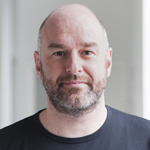
Director of the Basque Film Library since December 2010 and member of the San Sebastian International Film Festival Management Committee since January 2011. He is a Lecturer at the University of Nantes, specialising in Contemporary History and Film History. He received his doctorate degree from the University of Zaragoza and the University of Nantes. Since 2001, he has been a member of the Management and Selection Committees of the Festival du Cinéma Espagnol in Nantes and that year the Fenêtre Basque section was created in collaboration with the Basque Government. He co-directed, with Marta Horno, the documentary A las puertas de París (2008). He has written numerous articles on contemporary history in the Basque Country and film and has co-ordinated the following books: Federico Fellini (with Jesús Angulo), Cine y Guerra Civil en el País Vasco (with Santiago de Pablo), Conservación audiovisual en la era digital (with Alfonso del Amo), De Lumière a Kaurismäki. La clase obrera en el cine (with Carlos F. Heredero). He is also the editor of Cine vasco: tres generaciones de cineastas and wrote the book Euskal Zinema-Cine Vasco-Basque Cinema (2012, 2025). He's been a professor at the Bernardo Atxaga Chair at City University of New York (CUNY) in 2012 and 2017. He has been a professor of the Film Area at the Master in Cultural Management at Carlos III University since 2023.
He collaborated in setting the Elías Querejeta Zine Eskola film school in motion and is a member of its Academic Directorate.
JUAN G. ANDRÉS
(1977, San Sebastián)
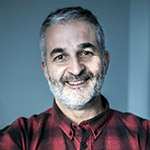 Holds a Degree in Journalism from the University of the Basque Country (UPV/EHU). Before joining San Sebastian Festival's Communications team in 2019, he worked for Radio Nacional de España, the Vasco Press and France Presse agencies, and the Noticias de Gipuzkoa and El Diario Vasco newspapers. For years his remit with the latter involved producing articles, chronicles and reviews on cultural information and the film and jazz festivals. Specialised in the cinema and music, he has also worked as a photographer and collaborator with publications including Caimán Cuadernos de cine, Rockdelux, Mundo Sonoro, Colección Nosferatu and the San Sebastian Festival daily. In addition to the above, he co-directed and produced the audiofiction series Artxipelagoa (2021) for EiTB, the Basque public radio and television company, and is author of the interview podcast, Estamos dentro.
Holds a Degree in Journalism from the University of the Basque Country (UPV/EHU). Before joining San Sebastian Festival's Communications team in 2019, he worked for Radio Nacional de España, the Vasco Press and France Presse agencies, and the Noticias de Gipuzkoa and El Diario Vasco newspapers. For years his remit with the latter involved producing articles, chronicles and reviews on cultural information and the film and jazz festivals. Specialised in the cinema and music, he has also worked as a photographer and collaborator with publications including Caimán Cuadernos de cine, Rockdelux, Mundo Sonoro, Colección Nosferatu and the San Sebastian Festival daily. In addition to the above, he co-directed and produced the audiofiction series Artxipelagoa (2021) for EiTB, the Basque public radio and television company, and is author of the interview podcast, Estamos dentro.
IONE HERNÁNDEZ SÁENZ
(1970, San Sebastián)
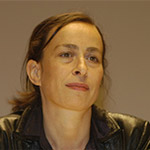 Holds a Degree in Journalism from the University of the Basque Country (UPV/EHU). She studied Communication at the Université Bordeaux Montaigne and, having worked as a journalist for the La Nación newspaper in Washington, moved to Los Angeles, where she completed her MFA Film Studies at Chapman University. She also took a course in screenwriting at the San Antonio de Los Baños International Film and Television School (Cuba). As a filmmaker she has directed and written several short films and documentaries shown internationally. Her shorts have been selected for Kimuak and Madrid en corto. El palacio de la Luna was named best short film of the year by the Cahiers du Cinema magazine, and her feature-length documentary 1 % Esquizofrenia, produced by Julio Medem, was released in cinemas. For the last five years she has been coordinator and tutor of the Master's Degree in Filmmaking at the EFTI International Photography and Film Centre in Madrid, while also giving workshops for students from deprived areas of Latin America as part of San Sebastian Festival's Gipuzkoa Coopera programme. Her feature film project Hermanas, currently in progress,was a finalist in the Film Academy residencies programme and landed Ventana CineMad's first prize 2021 as best fiction project. She is a member of the Academy of Arts and Cinematographic Sciences of Spain.
Holds a Degree in Journalism from the University of the Basque Country (UPV/EHU). She studied Communication at the Université Bordeaux Montaigne and, having worked as a journalist for the La Nación newspaper in Washington, moved to Los Angeles, where she completed her MFA Film Studies at Chapman University. She also took a course in screenwriting at the San Antonio de Los Baños International Film and Television School (Cuba). As a filmmaker she has directed and written several short films and documentaries shown internationally. Her shorts have been selected for Kimuak and Madrid en corto. El palacio de la Luna was named best short film of the year by the Cahiers du Cinema magazine, and her feature-length documentary 1 % Esquizofrenia, produced by Julio Medem, was released in cinemas. For the last five years she has been coordinator and tutor of the Master's Degree in Filmmaking at the EFTI International Photography and Film Centre in Madrid, while also giving workshops for students from deprived areas of Latin America as part of San Sebastian Festival's Gipuzkoa Coopera programme. Her feature film project Hermanas, currently in progress,was a finalist in the Film Academy residencies programme and landed Ventana CineMad's first prize 2021 as best fiction project. She is a member of the Academy of Arts and Cinematographic Sciences of Spain.
VICTOR IRIARTE
(1976, Bilbao)
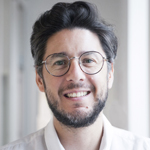 Graduate in Journalism from the University of Navarra, Post-graduate in Basque Contemporary Art from the University of Deusto and Master in Creative Documentary from the Pompeu Fabra University in Barcelona, today he is Head of Audiovisual Programmes at San Sebastian's Tabakalera Centre for Contemporary Culture, having belonged to the coordinating team of the International Film Students Meeting since 2013.
Graduate in Journalism from the University of Navarra, Post-graduate in Basque Contemporary Art from the University of Deusto and Master in Creative Documentary from the Pompeu Fabra University in Barcelona, today he is Head of Audiovisual Programmes at San Sebastian's Tabakalera Centre for Contemporary Culture, having belonged to the coordinating team of the International Film Students Meeting since 2013.
He began as a programmer at the Bilbao Fine Arts Museum Cinematheque, was a teacher of audiovisual language at the UM (Uruguay) and was resident artist and audiovisual programmer at the Arteleku art centre in San Sebastian. In 2001 he was second assistant director to Isaki Lacuesta on the feature film Cravan vs Cravan and in 2010 director of photography on the feature film Buenas noches, España, by the Filipino director, Raya Martin. Since 2005 he has been combining programming with his own creation, having directed several short films (Decir adiós, Kimuak catalogue 2007) and a feature film, Invisible (premiered at the FID Marseille in 2012).
He collaborated in setting the Elías Querejeta Zine Eskola film school in motion and is a member of its Academic Directorate.
ESPERANZA LUFFIEGO
(San Sebastian, 1963)
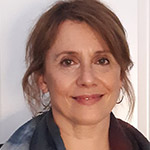 Graduate in Audiovisual Communication from the Complutense University of Madrid. She was joint head of San Sebastian Festival's Industry Department from 2012 until 2020, having curated the last two editions of the Ventana Sur Project in Argentina. She was formerly audiovisual coordinator of the Tabakalera International Centre for Contemporary Culture from 2008 until 2012; member of the Kimuak Programme selection committee in 2010; and was a member of the selection team for Grants to short film projects in development and production with the Basque Government Ministry of Culture in 2009. In 1990 and 1991 she was responsible for Programming at the Andalusian Filmothèque. In the field of education, she was formerly professor of History of Cinema and other Audiovisual Media at Deusto University's Faculty of Social and Human Sciences from 1999 until 2003; coordinator and teacher of the Aula de Cine at the Sarobe Performing Arts Centre; and professor of Audiovisual Production, Script and Language at the ESCIVI (Film and Video School) Vocational Education Centre in Andoain, from 1988 until 1990.
Graduate in Audiovisual Communication from the Complutense University of Madrid. She was joint head of San Sebastian Festival's Industry Department from 2012 until 2020, having curated the last two editions of the Ventana Sur Project in Argentina. She was formerly audiovisual coordinator of the Tabakalera International Centre for Contemporary Culture from 2008 until 2012; member of the Kimuak Programme selection committee in 2010; and was a member of the selection team for Grants to short film projects in development and production with the Basque Government Ministry of Culture in 2009. In 1990 and 1991 she was responsible for Programming at the Andalusian Filmothèque. In the field of education, she was formerly professor of History of Cinema and other Audiovisual Media at Deusto University's Faculty of Social and Human Sciences from 1999 until 2003; coordinator and teacher of the Aula de Cine at the Sarobe Performing Arts Centre; and professor of Audiovisual Production, Script and Language at the ESCIVI (Film and Video School) Vocational Education Centre in Andoain, from 1988 until 1990.
JAVIER MARTÍN
(1970, Valladolid)
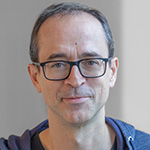 B.S. in Economics. He moved to Paris in 1995, working for the French distribution company Colifilms Distribution and for the production company Albares Productions. Between 2002 and 2019 he worked on programming at the Forum des images, a film institution subsidised by the City of Paris. Meanwhile he worked as a delegate for Latin America for the Cannes Quinzaine des Réalisateurs from 2006 until 2011, and for the Berlinale from 2013 until 2019. He was a member of the Quinzaine des Réalisateurs selection committee from 2010 to 2011 and of the Cinéma du Réel from 2014 until 2018. Today he is a delegate of the Marrakech Festival and programmer of the BIFF – Bogotá International Film Festival. Connected for years to the San Sebastian Festival, he coordinated the International Film School Meetings from 2005 to 2007. Since 2014 he has been an expert assessor of the Europe-Latin America Co-production Forum. In 2019 he sat on the Ikusmira Berriak committee of experts and he has participated as a professor in the Elías Querejeta Zine Eskola.
B.S. in Economics. He moved to Paris in 1995, working for the French distribution company Colifilms Distribution and for the production company Albares Productions. Between 2002 and 2019 he worked on programming at the Forum des images, a film institution subsidised by the City of Paris. Meanwhile he worked as a delegate for Latin America for the Cannes Quinzaine des Réalisateurs from 2006 until 2011, and for the Berlinale from 2013 until 2019. He was a member of the Quinzaine des Réalisateurs selection committee from 2010 to 2011 and of the Cinéma du Réel from 2014 until 2018. Today he is a delegate of the Marrakech Festival and programmer of the BIFF – Bogotá International Film Festival. Connected for years to the San Sebastian Festival, he coordinated the International Film School Meetings from 2005 to 2007. Since 2014 he has been an expert assessor of the Europe-Latin America Co-production Forum. In 2019 he sat on the Ikusmira Berriak committee of experts and he has participated as a professor in the Elías Querejeta Zine Eskola.
RUTH PÉREZ DE ANUCITA
(Errenteria, 1979)
 Graduate in Journalism and Master's Degree in Comparative Literature and Literary Studies from the University of the Basque Country. She has worked for more than ten years in the media, including El Mundo, Deia, Diario de Noticias de Álava and Noticias de Gipuzkoa, where, as head of the Culture section, she was responsible during seven years for reporting on the Festival. She has also worked in the Festival Daily editorial department. Until joining our team, she had been assistant manager of its cultural programme with the San Sebastian, European Capital of Culture 2016 Foundation. She wrote the script for the play on the 50th anniversary of the Lagun bookshop, has participated in the Kimuak short film selection (2018 and 2019) and served on the jury of FICLO (Festival Internacional de Cinema e Literatura de Olhão) in 2020.
Graduate in Journalism and Master's Degree in Comparative Literature and Literary Studies from the University of the Basque Country. She has worked for more than ten years in the media, including El Mundo, Deia, Diario de Noticias de Álava and Noticias de Gipuzkoa, where, as head of the Culture section, she was responsible during seven years for reporting on the Festival. She has also worked in the Festival Daily editorial department. Until joining our team, she had been assistant manager of its cultural programme with the San Sebastian, European Capital of Culture 2016 Foundation. She wrote the script for the play on the 50th anniversary of the Lagun bookshop, has participated in the Kimuak short film selection (2018 and 2019) and served on the jury of FICLO (Festival Internacional de Cinema e Literatura de Olhão) in 2020.
ANA ESPERANZA REDONDO
(1963, Andoain)
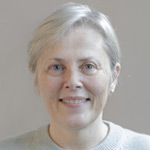 Received a degree in Art History from the University of Zaragoza in 1986 and dedicated her graduate thesis to San Sebastian Festival. Having worked from 1989 to 1991 at San Telmo Museum in San Sebastian as a Higher Technician, in 1991 she was appointed by San Sebastian Film Festival to the archives and documentation department. In 2000 she started collaborating with the Festival Management Committee until 2013, sitting on this and the Selection Committee until 2010, a task she combined with her work as documentalist with the Documentation and Film Department.
Received a degree in Art History from the University of Zaragoza in 1986 and dedicated her graduate thesis to San Sebastian Festival. Having worked from 1989 to 1991 at San Telmo Museum in San Sebastian as a Higher Technician, in 1991 she was appointed by San Sebastian Film Festival to the archives and documentation department. In 2000 she started collaborating with the Festival Management Committee until 2013, sitting on this and the Selection Committee until 2010, a task she combined with her work as documentalist with the Documentation and Film Department.
